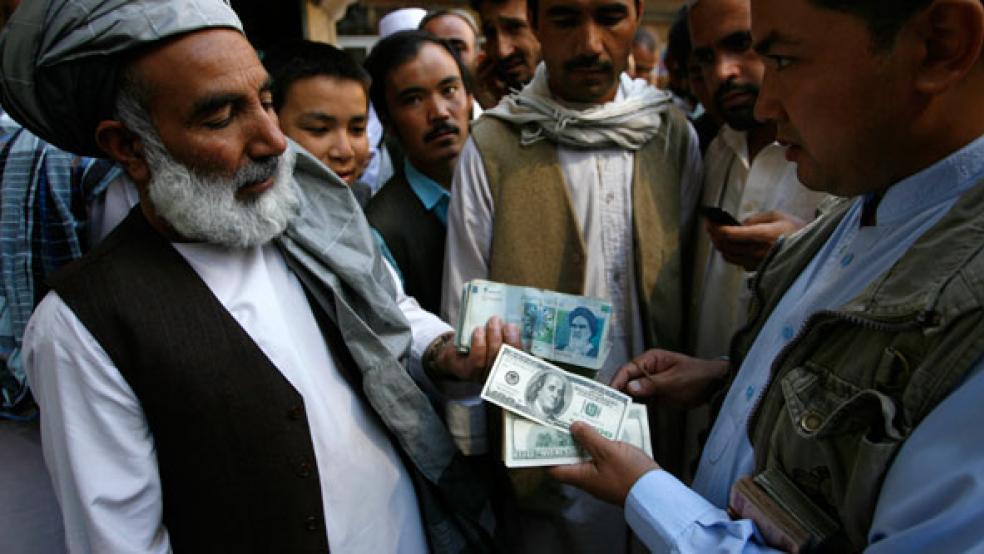President Hamid Karzai’s successor will have to battle more than just the Taliban. A culture of corruption is entrenched within Afghanistan’s borders.
As Afghans as well as the international community await results from the country’s presidential elections held earlier this month, attempts to reverse Karzai’s legacy of corruption continue to be slow going. But while the onus for reform is expected to fall on the next president’s shoulders, several experts and watchdog groups say the U.S. must share the burden of weeding out fraud and questionable accounting practices in Afghanistan.
Related: The U.S. Has Finally Outfoxed Hamid Karzai
Through mid-January, the U.S. had provided more than $25 billion to support governance and economic development in Afghanistan, with almost $17 billion administered by the State Department and the U.S. Agency for International Development (USAID). Overall U.S. funding for reconstruction is expected to exceed $100 billion by Sept. 30, the end of the fiscal year.
A thorough accounting of those funds has fallen short over the past decade. Both State and USAID say Afghanistan’s High Office of Oversight and Anticorruption “is dysfunctional, ineffective, and politicized,” and is failing to set a top-down precedent for transparency. If nothing else, though, the politicized aspect suggests that new political leadership could chip away at the pervasive nature of bribery and corruption that have not only wasted billions of American dollars but also deprived Afghans of government revenue.
Former Foreign Minister Abdullah Abdullah has widened his lead, according to the latest tally reported by Reuters. He’s trailed by Ashraf Ghani, a former World Bank official. Final results are expected later this week. If no candidate wins a majority of the vote, a runoff will take place.
Karzai is constitutionally mandated to step down after his second five-year term as president. His tenure comes to an end at a time when the U.S. is withdrawing most of its combat troops in Afghanistan.
In addition to the new president’s task of shaking Karzai’s legacy of corruption, the successor will also need to establish legitimacy following accusations of election fraud from some of the nine presidential candidates.
Related: America’s Ugly Win in Afghanistan
Some recent initiatives are attempting to lay the foundation for more accountability by using both the carrot and the stick.
On the military front, the Pentagon reports that for the first time, the Combined Security Transition Command in Afghanistan is using what it calls a “financial levers strategy,” designed to withhold and disburse payments to the country’s Ministry of Defense and Ministry of Interior based on performance.
To many, though, these efforts are a decade late, particularly when considering the amount of leverage U.S. commanders and donors wielded in the early years of U.S. military operations.
For that reason, the Special Inspector General for Afghanistan Reconstruction has not hesitated to point the finger of blame at U.S. agencies as well. In a recent report, it noted, “The Defense Department has committed more than $4 billion to the Afghan Ministry of Defense and Ministry of Interior without conducting a comprehensive risk assessment of the two ministries’ financial-management capabilities.”
Related: $6 Billion Goes Missing at State Department
“As the U.S. drawdown continues, implementing agencies and oversight bodies will have far less visibility over the reconstruction programs than in the past,” John F. Sopko, head of the watchdog group, wrote in his most recent quarterly report to Congress. “Effective oversight has never been more important than now.”
Some analysts are optimistic that a new administration in Afghanistan will be a trusted partner in providing critically needed oversight.
“In the last decade there was more money to spend but without the proper framework,” Shahmahmood Miakhel, Afghanistan country director for the United States Institute for Peace, said in the lead-up to the elections. “In the future there will be less money, but I am sure there will be better accountability. The effectiveness of assistance will be improved with the next government.”
Top Reads from The Fiscal Times:





